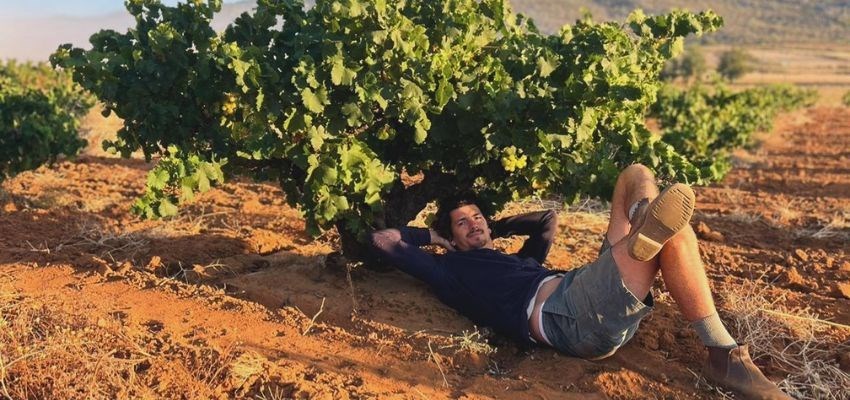
This is the first time the young winemaker (just over the edge of 30), is showing his full line-up of wines in one sitting.
The eponymous range are all minimalist, texture-driven, skin-contact wines. Colombo says he keeps the sense of site intact by extracting whole bunches ‘very lightly’.
“I make wines I want to drink myself, but when other people like to drink them too, then that’s quite lovely.”
Sourcing your own grapes requires a fair amount of tarmac. “As I find vineyards I’m slowly sliding up the West Coast…I’m very drawn to the terroir. How desertic it is, it seems impossible that anyone can grow a vine up there. It’s not celebrated enough, it has a lot of the Cape’s oldest vineyards.”
Much of which are old vine Muscat. For one of his wines he flips the paradigm of this cultivar, making a dry version instead of the usual sweet. “Dinosaur vines that have been around for the past century, dotting a Martian landscape,” he says somewhat poetically of the site found on his friend Sakkie Mouton’s family farm in Vredendal. Mouton himself is quickly becoming a cult figure in the younger generation of winemaking.
“It wasn’t easy to get to and by no means convenient,” Colombo recalls, part of which is the six-hour drive back to Gabriëlskloof’s cellar where he makes the wines.
The young winemaker is drawn to the West Coast for more than just its long-suffering vines, he’s got deep roots there himself, too.
“My dad’s family moved to Velddrif from Italy during the war,” he shares, and his mom currently lives in Redelinghuys, an even smaller West Coast village. “My ouma is from Piketberg, and my oupa was once the mayor of Langebaan.” With a lineage like that he may as well be West Coast royalty.
“I grew up in Hout Bay, my Afrikaans is appalling,” he says laughing. “It makes it a bit tougher to break into the West Coast, until I tell them my mom is from Redelinghuys,” he says with a smile.
He’s no stranger to wine farming either, his father used to own the property that is now Brookdale in Paarl. In fact, his family planted the famed old vine chenin vineyard that the estate now brings to bottle. “When I was a teenager I used to drive the tractor around there, help with the harvest.
“I got my driver’s licence in a ten-tonne truck, because that was what I knew…”
He went on to study at Stellenbosch University, with a variety of subjects from soil science to economics, not yet really knowing what he wanted to do with his life. All his friends he admits already thought of him as the ‘wine guy’, but the bug only bit after a five-year stint in Europe that saw him travelling to cities like Amsterdam, Barcelona and London, where wine bar culture was taking off, big time.
“I got deep into the natural wine scene, and by the time I moved back to Cape Town, my friend Matt Freemantle had opened Leo’s. I told him I would be his number one employee,” he says of the bagel shop that becomes a natural wine bar at night.
“Then it was a snowball effect. I met loads of winemakers. Eventually I was invited to do some cellar work at Kaapzicht, and absolutely loved it.” From there he went to Gabriëlskloof, Peter-Allan Finlayson granting him the privilege of making some of his own barrels. Then, COVID hit. With all the restrictions in place forbidding the production of alcohol, Colombo secured an opportunity to work at Matassa in the Roussillon with Tom Lubbe.
“I may not have studied winemaking, but I know what good wine tastes like. I’m an intuitive winemaker. Working with Tom opened my eyes to how everything is based on taste and how you feel, rather than following recipes.”
A stint followed in the vertiginous vineyards of the Mosel, and Colombo was ready to come home. He was welcomed back into the zany fold that makes up Gabriëlskloof’s cellar. Marelise Niemann and John Seccombe make their wines there too.
These days Colombo calls Fish Hoek home, where he spends most of his time with his wife, young daughter and newborn son. His production is currently at 6000 bottles, with the aim to up it to 15000 in 2024. Prudent, since demand for his wines is growing exponentially, particularly in the export market.
Down to earth, true to himself, and making excellent, clean, textural wines, Dan Colombo Wines is one to watch.
This article was originally published on WOSA's blog, Cape Chatter.